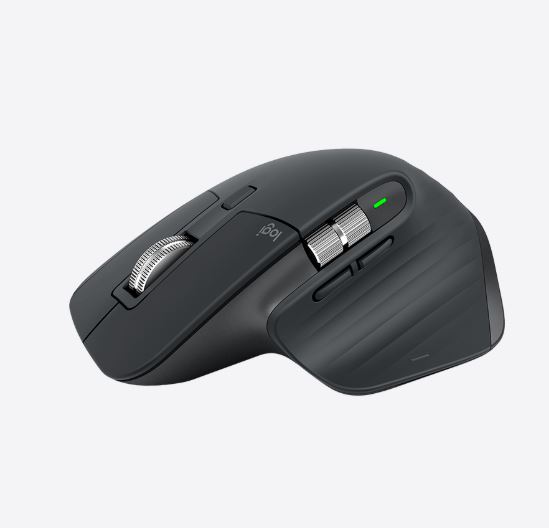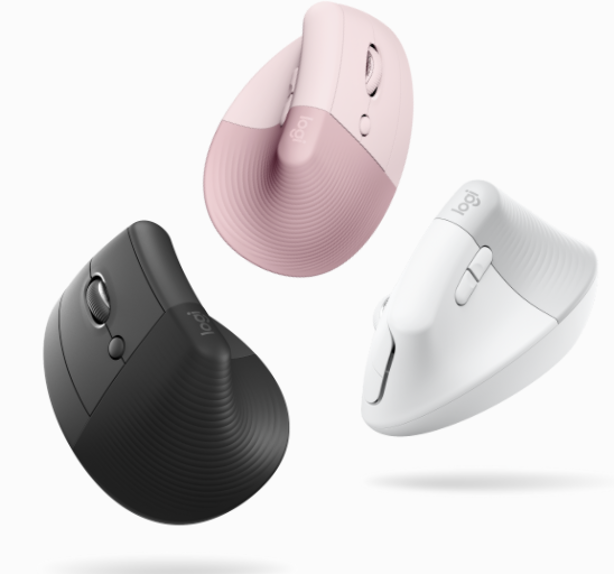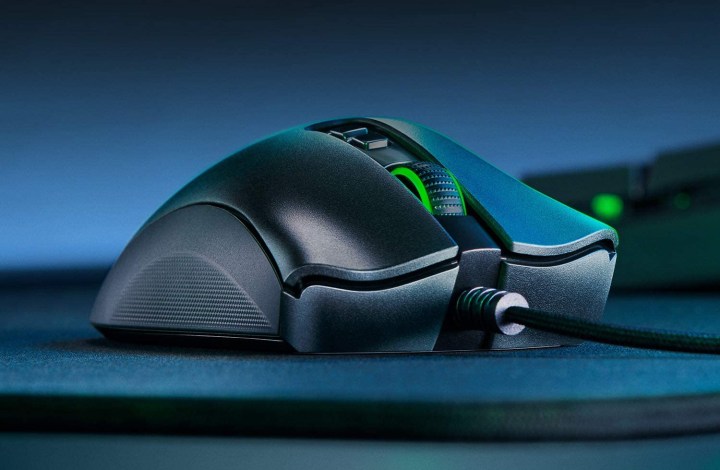If you’ve ever had pain in your hands or wrists, you know it can severely affect your productivity. An ergonomic computer mouse can fit in your hands properly and ease the pain and numbness of working at your computer all day.
Fortunately, there are plenty of options for ergonomic computer mice regardless of your budget or other needs. You can choose a mouse with a traditional design or something more modern. Read on to learn which ergonomic mouse is right for you, and more ways on how you can choose one that’s just right.
Many of the best ergonomic mice are wireless too. If that’s more important to you, check out our list of the best wireless mice instead. Don’t forget to pair it with a great keyboard, too.

Logitech MX Vertical
Pros
- One of the best vertical designs
- Rubber and aluminum frame
- Wired and wireless options
Why you should buy this: Vertical mice give the most comfort long term, and this one is the best of the best.
Who it’s for: People who will be scrolling on a computer screen for most of their day.
Why we picked the Logitech MX Vertical:
Building off developments in its other ergonomic mice, Logitech’s MX Vertical is the company’s first real attempt at a tall mouse that tackles the problems commonly associated with long-term mousing discomfort. Logitech claims it can offer up to a 10% reduction in muscle strain with extended usage. While that sort of metric is hard to test accurately, we did find it supremely comfortable during our testing. Better yet, it’s intuitive and easy to get to grips with.
With a hefty but not overblown tilt angle of 57 degrees, the MX Vertical remains functional as an everyday mouse while still providing the benefits of a more ergonomic peripheral. Its natural wrist positioning forces you to rest your hand in a more conducive to long-term wrist health.
On top of all of its ergonomic features, this mouse looks good, too. Its combination of rubber and aluminum gives it a premium feel and finish that, for $100, feels well worth it to enjoy the benefits of ergonomic mousing. With wired and wireless options over Bluetooth (up to four months of battery life) and USB, it should work fine while you’re on the move or when tethered to a desk. Despite stiff competition, the Logitech MX Vertical steams ahead as the best ergonomic mouse you can buy today.


Logitech MX Master 3
Pros
- Very durable
- Compatible with multiple platforms
- Powerful scrolling wheel
Cons
- Additional side scrolling wheel not for everyone
Why you should buy this: It’s a modern, comfortable ergonomic mouse.
Who it’s for: People who don’t want a vertical mouse, but still need something that is ergonomic.
Why we picked the Logitech MX Master 3:
On the surface, the MX Master 3 looks a lot like its predecessor the Master 2s, but it is a lot more modern. With a new MagSpeed Wheel and the same comfortable side palm grips as the Master 2S, this mouse lets you scroll through the web with ease. Your hands will make contact with every corner and fit right into its grips. There are also side buttons to help with faster navigation.
The MX Master 3 is also more durable compared to other ergonomic mice on our list as it’s made of stainless steel, not the traditional rubber material. It even works with multiple PCs, Macs, and tablets thanks to a handy switch on the bottom. Charging is done via USB-C for up to 70 hours on a full charge.


Logitech
Logitech Lift Vertical Ergonomic Mouse
Pros
- A more affordable Logitech option
- Designed for comfort
- Left-handed option available
Cons
- Made mostly for small to medium hands
Why you should buy this: It’s a premium ergonomic mouse with a budget price tag.
Who it’s for: Those who love Logitech mice and want one designed specifically for good hand posture.
Why we picked the Logitech Lift:
The Lift is a mouse made for maximum comfort, a wireless model with a sculpted design made to help your hand rest in the most natural “handshake” position possible. It also manages to make room for six buttons total, including back/forward buttons and a middle click option. It’s also more affordable than other Logitech picks, making it a good choice for those who like the Logitech approach but would rather save money, too.
The optical sensor in the Lift has a 400 to 4000DPI range and is adjustable in 100DPI increments. It operates on a single AA battery that can last up to two years before it needs replacing. It’s also available in a left-handed version. The only downside worth noting here is that the mouse is specifically made for small and medium hands, so if your hands are on the larger side you may not find it a good fit.

Logitech Lift Vertical Ergonomic Mouse

Anker Wireless Vertical
Pros
- Multiple DPS options
- Five buttons for assigning commands
- Power-saving mode
Cons
- May be too large for some users
Why you should buy this: If you need an alternative to the Logitech MX Vertical.
Who it’s for: Folks who want an accurate vertical mouse with a solid design.
Why we picked the Anker Wireless Vertical:
Your wrists don’t care how expensive an ergonomic mouse is, which can be a problem for those who don’t want to spend a lot of cash on a mouse replacement. Fortunately, Anker’s solution is a great vertical ergonomic model that’s as affordable a mouse as you can find. It offers options for 800, 1,200, or 1,600 DPI optical tracking that you can switch between to find the sensitivity that you like and includes built-in previous/next buttons for easy browsing — although they, like all five buttons on the mouse, can be mapped to different commands if you prefer.
While the Anker Wireless Vertical runs on two AAA batteries, it does help conserve battery life with a power-saving mode that it will enter after eight minutes without use. While we’re fans of the design and the price is amazing, we should note that this mouse is a bit large. If you have especially small hands, it might prove not easy to use. It’s also right-handed only.


Microsoft Sculpt
Pros
- Great for smaller hands
- Designed to reduce wrist strain
- Offers good palm support
Why you should buy this: It’s one of the smallest ergonomic mice on the market.
Who it’s for: People who have small hands or need an ergonomic mouse that’s not too large.
Why we picked the Microsoft Sculpt:
Taking a much more minimalist approach to ergonomic mouse design, Microsoft’s Sculpt mouse is a rounded blob designed to offer reliable palm support without extraneous features. It has a thumb rest to cushion your thumb into the side of the mouse, but its bulbous design, as we called it, is intended to teach you to lift your wrist off of your mat or desk when using it — encouraging the use of forearm muscles rather than wrist tendons to support your hand.
Effectively, the Sculpt aims to have you do the hard work of supporting your wrist and mousing hand yourself, rather than acting as an overall supportive tool for you.
The Sculpt has the usual pair of left/right-click buttons and a central scroll wheel to move in four directions. It also has a side-mounted “Windows” button, which gives Windows users quick access to the Start menu and a secret “back” button hidden near the mouse’s rear for faster browser navigation.
This Microsoft Sculpt is powered by just two AA batteries and connects up to your PC using an included 2.4GHz USB dongle. If you don’t like this mouse’s shape but do like its other features, Microsoft also has a “comfort” mouse with a more traditional shape that you might like.


Razer DeathAdder Elite V2
Pros
- Excellent gaming mouse with 8 programmable buttons
- A left-handed version is available
- RGB options
Cons
- Dedicated gamers may prefer a mouse with more features
Why you should buy this: If you’re a gamer in need of an ambidextrous mouse, this is one of the best ergonomic options.
Who is it for: Gamers who need a nimble, sensitive mouse.
Why we picked the Razer DeathAdder Elite V2:
The Razer DeathAdder Elite V2 is one of the best ergonomic gaming mice, featuring both high sensitivity for accurate gaming and eight programmable buttons for a variety of shortcuts. One of the best mice we have ever reviewed, this model also manages to provide decent support for your wrist and hand, regardless of your grip style.
This mouse features a sleek body with the classic DeathAdder look and feel that gamers love. This mouse’s ergonomic focus is on providing adequate wrist support, but it didn’t include a proper thumb rest. You will find an indention for your thumb, which aids your grip, but no actual rest.
This is a gaming mouse first and foremost, and as a result, it has the most exacting performance specifications of any of the mice in our roundup. It uses a razor-sharp 20,000 DPI optical sensor, with durable mechanical switches and Razer’s exclusive Chroma RGB lighting system. The Razer also comes with exclusive back-end software for key remapping and custom color options.
Unlike many of the best ergonomic mice, Razer also produces a left-handed version of its DeathAdder Elite, too.

Razer DeathAdder Elite V2

Jelly Comb Ergonomic Wireless Mouse
Pros
- Affordable
- Slim handshake design
- Adjustable DPI
Why you should buy this: It’s super comfortable and incredibly affordable.
Who it’s for: People with small hands and those who want to save money
Why we picked the Razer Jelly Comb Ergonomic Wireless Mouse:
If your ergonomic mouse feels uncomfortable, it could be the wrong size for your hands and may even do more harm than good. If you prefer smaller mice in general, look for ergonomic options made for smaller hands — like this clever model from Jelly Comb, a wireless, upright mouse with a “handshake” grip designed for comfort, and only around 4.1 inches long.
The mouse also has adjustable DPI options to choose between 1,000, 1,200, 0r 1,500 DPI. This, along with its compact size, also makes it an excellent traveling mouse, and one hour of battery charging should last for around two months of work (helped by an automatic sleep mode). We also like the muted clicking noise, which makes it easier to avoid disturbing others as you work.
While the design is simple, the mouse does make room for a scrolling wheel and six multi-function buttons (not compatible with Macs) plus a small indicator light for the battery. Note that the Jelly Comb Ergonomic Wireless Mouse does require a USB-A port for its dongle, so make sure you have room. It’s also a right-handed mouse.

Jelly Comb Ergonomic Wireless Mouse
Frequently Asked Questions
How do I choose an ergonomic mouse?
Try the mouse out in person, if possible, or check reviews and overall features when making your choice. Decide early on if you want a vertical mouse (where your hand is in a handshake position, common for those with wrist issues) or a more traditional horizontal mouse with added support. Where are your pain points, and what positions relieve them? Some models specialize in thumb relief so your thumb doesn’t get frozen after a long day of work, while others, like trackballs, focus on helping people with shoulder pain. Ultimately, you’re the one best qualified to make the decision.
Can ergonomic mice help with carpal tunnel?
This is where vertical mice can be particularly useful. A vertical mouse like our Anker wireless model above puts your wrist and hand in a handshake-like position while you work. For those with carpal tunnel and related wrist issues, that position tends to feel more natural and less painful and is certainly worth a try if you’ve been struggling.
Are trackball mice considered ergonomic?
A trackball mouse allows you to use short, gentle finger and palm (or sometimes only thumb) movements to control the cursor. This is helpful for those recovering from injuries or faced with accessibility issues as well as those suffering from shoulder pain that comes with more exaggerated movements. It may also be helpful if your fingers suffer from bad arthritis. Trackpads are another alternative worth looking into.
Ambidextrous mice vs. ergonomic: What’s the difference?
An ambidextrous mouse has a neutral design that allows you to use it with your right or left hand as needed (not to be confused with mice that are specifically left-handed). An ergonomic mouse is designed to reduce necessary movement and encourage more comfortable, healthier hand positioning. The issue is that those two goals are often incompatible, so it’s more difficult to find an ergonomic mouse that’s also ambidextrous. If you are primarily interested in mouse performance, not reducing pain, then try them both to see which you like best.
Is an ergonomic mouse worth it?
There is no magic mouse shape that will solve every issue — much of it is personal preference and what your goals are. That being said, various ergonomic mouse shapes have garnered plenty of praise for reducing pain and managing injuries, so if you are struggling we certainly suggest looking into your ergonomic options. And don’t stop with a mouse! The right ergonomic keyboard with a wrist pad may also help.
Editors’ Recommendations


